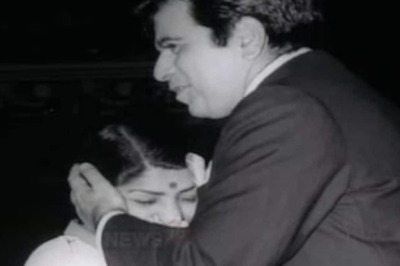
views
Sanaa: Yemen's political upheaval has emboldened suspected al-Qaida militants who have seized a provincial capital and now are operating openly in the lawless south, training with live ammunition and controlling roads with checkpoints.
The US fears the power vacuum will give even freer rein to al-Qaida's branch in Yemen - already the terror network's most active franchise.
Yemen's government said on Thursday that troops killed 12 suspected al-Qaida militants as part of a campaign to retake the southern city of Zinjibar.
Hundreds of militants seized the capital of troubled Abyan province on May 27, taking advantage of a breakdown of authority resulting from the government's battle with armed tribesmen seeking to topple President Ali Abdullah Saleh, the country's autocratic leader of more than three decades.
Yemen's crisis has deepened further since Saleh was critically wounded in a June 3 rocket attack on his compound and flown to neighboring Saudi Arabia for urgent medical treatment. US officials say the 69-year-old Saleh suffered burns over 40 percent of his body and has bleeding inside his skull.
The developments have fueled fears of growing instability in a nation that has been a launching pad for repeated attacks against the United States.
The Yemen-based al-Qaida in the Arabian Peninsula has been linked to several attempted attacks on US targets, including the foiled Christmas Day 2009 bombing of an airliner over Detroit and explosives-laden parcels intercepted aboard cargo flights last year.
Yemen is also home to radical US-born Muslim cleric Anwar al-Awlaki, whom Washington has put on a kill-or-capture list and accused of inspiring attacks on the US, including the 2009 shooting at Fort Hood, Texas, that killed 13 people.
In Abu Dhabi, US Secretary of State Hillary Rodham Clinton called Thursday on all sides to honor a cease-fire. She said Washington was pushing for an "immediate, orderly and peaceful transition" in Yemen.
The 12 suspected al-Qaida militants were killed in gunbattles as government troops pressed toward Zinjibar, the Defense Ministry said. It said three soldiers were wounded. The deaths followed the killings of 30 suspected militants earlier this week.
Saleh, who has clung to power in the face of massive street protests since February, had in recent weeks deployed his best armed and trained military units to fight tribesmen in the capital, Sanaa, who have joined in demands for an end to his regime.
While Saleh's departure for Saudi Arabia has led to a lull in fighting in the capital, it remains fraught with tension as troops led by Saleh's son and close relatives square off against the heavily armed tribesmen.
Additionally, Yemen is beset by a growing secessionist movement in the south, which was once an independent nation, and an on-and-off revolt by Shiite rebels in the north.
The political impasse and commitment of elite forces to the fight in Sanaa has left al-Qaida free to try to entrench its presence in a country that appears inching toward collapse. Emboldened, the militants have made inroads deep in the Yemeni hinterland and on its rugged mountain ranges.
In Abyan, residents said suspected al-Qaida militants were openly training in camps and using live ammunition for target practice. They were also carrying out identity checks on travelers on roads leading to neighboring provinces.
"They have a great deal of influence and they use modern vehicles for transport as well as satellite telephones," said Abdullah al-Amari, an Abyan-based rights activist.
Residents of the southern province of Shabwa said suspected al-Qaida militants and sympathizers had set up checkpoints on the road to the nearby province of Hadramawt They also controlled the towns of Rawdah and Houtah, where they freely roamed the streets.
Shabwa-based army Lt Col Hassan Radwan said his unit knew the whereabouts of al-Qaida fighters in the province as well as their training camps. "But when we tell our commanders, they tell us that they are just local tribesmen," he said.
At Hadramawt, a southern province on the Arabian Sea coast, activist Nasser Baqezqouz said the militants were so much at ease in the area that "they play dominoes in cafes without any fear."
Saleh's regime has long taken an ambivalent approach toward militants, making him a less-than-reliable partner in the US fight against al-Qaida.
There is a blurred line between Yemen's large and diverse community of militants and al-Qaida, which is thought to have no more than 300 hard-core members in Yemen. The militants have varying levels of links to the terror network.
Saleh has allied with many of these groups to promote his own interests against political rivals that include moderate Islamists, leftist parties and secular-minded intellectuals. He has sought the militants' help to "Islamize" the south, where secular traditions endure two decades after it was united with the conservative north.
He has used the country's oil wealth and tens of millions of dollars from Western backers to tighten his grip on power, buying modern arms for elite units led by his family and bankrolling an elaborate patronage system to ensure the loyalty of powerful tribes and influential politicians.
The upheaval of the past months has left Saleh too preoccupied to focus on the fight against al-Qaida, and the United States has stepped up its covert operations in Yemen.
American officials said Thursday that a US airstrike on June 3 killed a midlevel al-Qaida operative named Abu Ali al-Harithia in southern Yemen.
A drone strike by US special operations forces on May 5 targeted al-Awlaki, but a malfunction caused rockets to miss him by a matter of minutes, two American officials told. The officials spoke on condition of anonymity to discuss intelligence matters.
The recent US operations in Yemen come after a nearly yearlong pause in American airstrikes, which were halted amid concerns that poor intelligence had led to bungled missions and civilian deaths that were undercutting the goals of the secret campaign.
Saleh authorized secret American missions in Yemen in 2009 but placed limits on their scope and has said publicly that all military operations have been conducted by his own troops.



















Comments
0 comment